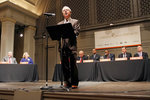





Frank Blethen starts his workday at 3 a.m. Before the sun is even up, the Seattle Times publisher is spending his morning reading the Wall Street Journal, New York Times and his own newspaper. About an hour later, he moves into his bedroom, which he has converted into his office. Like many of us working from home during the COVID-19 pandemic, Blethen now communicates with his staff mostly through a computer screen. Despite his long career in journalism, navigating his newsroom in the middle of a global pandemic is something no one expects. But as some of his colleagues shared, if any publisher can deal with this challenge, it’s Blethen.
Blethen, 75, was named publisher of the Times in 1985. He’s a fourth-generation member of the family that founded the publication 124 years ago. Although he grew up in Arizona with his mother, he spent his summers in Seattle with his father and working at the paper. As he spent more time with the Blethen side of the family and getting to know his cousins, he got hooked on the family business. After graduating from Arizona State University, he decided to move to Seattle and work full-time at the Times starting in 1968.
“I wanted to try working there for a year,” Blethen said.
One year became a few more years as he moved through the ranks in the advertising department before being named publisher of the Walla Walla Union-Bulletin, another Times publication, at the age of 30. He spent four years there before returning to the Times, where he was instrumental in crafting the joint operating agreement with the Seattle Post-Intelligencer (the newspaper became an online-only publication in 2009). Around the same time, Blethen was being groomed to become the next publisher of the Times. He explained there was going to be a five-year transition plan when the current publisher, W.J. “Jerry” Pennington, would retire and Blethen would succeed him. The transition plan turned out to just be one week when Pennington suddenly died in a boating accident.
Although he was thrust into the role of publisher much quicker than he anticipated, Blethen said family was key in aiding him. Thirty-five years later, family is still one of Blethen’s priorities as he fights to keep the local free press alive for future generations, not only in Seattle, but around the country.
The Accidental Publisher
Blethen might describe his journey to becoming a publisher as an “accident,” but you wouldn’t be able to tell by how he operates. When the first reported U.S. coronavirus case and death occurred in the state of Washington at the beginning of the year, the Times newsroom was already on top of the story. They were also one of the first newsrooms to start working remotely from home. In addition to covering a health pandemic, the news cycle in Seattle has revolved around hefty issues such as politics, wildfires and racial injustice.
“Just covering one of those subjects in a year is hard enough,” said associate publisher turned health reporter Ryan Blethen. “From a journalism point of view, it’s been exhilarating, but we can’t lose sight of the human and emotional toll.”
Ryan, who is Blethen’s eldest son and a fifth-generation member of the family, added that when it comes to working under pressure, his father thrives on adversity, citing the various trials and tribulations the industry has endured since his father became publisher including the Great Recession in 2008. Watching his father handle those tumultuous times and today’s hardships serves as an example for him. Ryan, who is lately focused on covering COVID-19 for the paper, said even on his hard days, knowing his father is up early at the crack of dawn already at work, is what keeps him motivated.
Despite all the curveballs that have been thrown at them this year, the Times also received some good news in May when the paper received a Pulitzer Prize in National Reporting for stories that exposed design flaws in the Boeing 737 MAX that led to two deadly crashes and revealed failures in government oversight. Out of the 11 Pulitzer Prizes the Times has won, Blethen has been publisher for eight of those awards. In addition, the Times has been a finalist 14 times—all under Blethen’s watch.
That repeated recognition is a testament to Blethen’s leadership and unwavering commitment to local community journalism.
“When our heads are down focused on deadlines, Frank forces us to pull back and look up, and think big, think long term,” said executive editor Michele Matassa Flores. “Inequity is a huge issue to Frank, so he’s constantly asking us, ‘Is your coverage doing anything to improve issues?’”
For example, when Blethen saw the inequity taking place in the public school system, he created in 2011, the Greater Good Campaign, “a public service campaign to improve public education in Washington, prioritize state funding for education and drive student-focused change,” and the Education Lab, the paper’s first community funded public service journalism project, in 2013.
The Education Lab was just the start; other community funded projects followed, including the Traffic Lab, examining the region’s traffic problems and the impact of transportation projects and timelines; Project Homeless, exploring and explaining the systemic issues causing homelessness in the region; the A.I. Age, where a Times business reporter spent a year examining the social, economic and ethical implications of artificial intelligence; and the latest project, the Investigative Journalism Fund, launched in 2019 with the goal of building one of the nation’s largest local investigative teams. Since 2013, community funders, including nonprofits, corporations and philanthropic foundations, have supported this work with more than $5.5 million, according to the Times. Many of those donors include contributors like the Bill & Melinda Gates Foundation, Amazon and Starbucks.
“A lot of that success is due to Frank leveraging his personal and business contacts, and his relentless passion with seeing the community thrive,” said Kati Erwert, senior vice president of product, marketing and public service.
For Blethen, it’s about building relationships. He explained that when he speaks to potential donors, he makes sure to emphasize that they’re not giving to a hedge fund or an absentee owner.
“You’re investing in your journalism,” he tells them.
As more papers around the country embrace community funded journalism, the Times has become a model for them to emulate. Recently, the Local Media Association (LMA) announced it was partnering with the Times to develop curriculum for its Lab for Journalism Funding, where 16 publishers will focus on strategies to fund journalism through philanthropy.
“When it comes to funding journalism through philanthropy, no for-profit media company does it better than The Seattle Times,” Nancy Lane, chief executive officer of LMA, said in the announcement. “They’ve been at it the longest and have the best track record of success.”
Matassa Flores credited Blethen’s business acumen for paving the way. “With today’s economic challenges, he’s much more determined in finding alternative sources of revenue, such as with the Labs. The Labs will sustain us over time and open us to new possibilities…Frank’s not afraid of change. He insists on it, whether that’s with new areas of coverage or with business ideas.”
Erwert added, “Frank’s not the kind of publisher who looks to the past with nostalgia, waxing on about journalism’s golden years. He’s very forward focused, and I appreciate that about him. I’ve been here 13 years, and I still feel as energized today as I did back then.”
That kind of forward thinking has also translated to more subscriptions, particularly when it comes to their digital circulation.
“Frank has been very supportive of the subscription-driven model,” Matassa Flores said. “He saw very early on the future of subscriptions in both print and digital. He also saw right away we needed to find new audiences and forced us to look at our younger readers.”
Blethen also implemented Transformation 2030, a process where the paper will track each audience cohort (from millennials to boomers) from 2017 to 2030, in order to tailor and deliver the right content and products for them.
Blethen credited his staff with being “superb with getting subscriptions.” One of them being Times president and chief financial officer Alan Fisco who started in the circulation department, serving as its vice president.
“We started having these conversations about digital in 2012,” he said. “At the same time, digital revenue wasn’t growing leaps and bounds like everyone said it was going to. Instead, we chose to pivot to audience revenue and focus on the commodity of ‘eyeballs’ and driving our subscriptions.”
In the end, the decision paid off. Fisco shared that the Times currently has about 70,000 digital subscribers; 20,000 of them acquired just in the past six months.
Saving the Free Press
When he’s not busy writing letters or making phone calls to donors, Blethen is thinking about the future of journalism, specifically on saving the free press. But he’s not only focused on ensuring the success of his own publications in Seattle and at the Walla Walla Union-Bulletin and Yakima Herald-Republic, he’s also thinking about the other news publishers around the country. In 2020, COVID-19 only amplified the growth of news deserts and ghost newspapers as more than 60 newsrooms have closed this year, according to the latest reports from Poynter.
Last year, Blethen launched the Save the Free Press Initiative, which, in Blethen’s own words, would serve two purposes: to “reform newspaper ownership by returning to a national system based on localism and trust;” and to “reform the internet to enable local newspapers to hire more journalists and produce more news.”
According to Fisco, Blethen has dedicated resources to the initiative by “(mobilizing) a team at the Times to expand coverage of free press related issues. This includes the hiring of a Free Press writer position within the editorial staff, specifically focused on exposing threats and solutions to the national free press system. Topics covered include surfacing key academic studies that correlate a healthy and robust free press system to a healthy democracy, critical reductions of local media outlets and the impacts of unregulated big tech companies on local journalism.”
Blethen has also been a vocal supporter and advocate of the Local Journalism Sustainability Act—otherwise known as HR 7640—a bill that was introduced to the U.S. House of Representatives in July. The Act would provide tax credits to local newspapers. At press time, there were 66 cosponsors to the bill.
“It’s a point of pride to see our publisher go out there and tell legislative leaders that local journalism needs their support,” Erwert said.
Not only does Blethen want to inform government officials, he also works hard to engage with readers and educate them about the topic—inside and outside Seattle. Several of his op-eds related to the free press and local journalism have appeared in the Times and the Washington Post.
“He’s a maniac when it comes to getting the word out,” Matassa Flores said. “He wants the world to hear and understand the perils we’re facing in journalism.”
To Blethen, getting the word out is just an extension of his role as publisher. “What I’m telling the community is that ‘I’m doing this for you and your family and your kids…it never hurts to remind people because once they understand, they’ll embrace the paper more and the concept and importance of having a free press.”
Keeping It in the Family
Both Fisco and Matassa Flores have spent nearly 30 years working at the Times. Erwert joined the company in 2007. What has kept them at the Times for so long? For all three of them it came down to two things: the shared mission at the Times of keeping local independent journalism alive and their loyalty to the Blethen family.
“There is a culture at the Times centered on collaboration and that comes straight from the top,” Matassa Flores said. “Working for a family-owned newsroom is something special.”
“We all have deep roots here in the community,” Erwert explained. “Having local independent ownership makes a difference…it’s exciting to work at a place where we can actually save the free press.”
Fisco said he has seen the Blethen family overcome a lot of battles to protect local ownership, and he expects the Times to stay locally-owned and independent for the next 100 years.
That’s undoubtedly the same vision Blethen sees when he looks ahead. “I want to keep the Seattle Times family-owned and make it multigenerational moving forward.”
Ryan Blethen, who started in the mailroom when he was 13 years old, is 47 now, and he certainly has the experience to step up to be publisher when the moment arrives, but he doesn’t expect that to be anytime soon since he doesn’t see his father going anywhere for the time being.
“As his son, I would love to see him cut back and focus on doing things he enjoys,” Ryan said. “But he’s still doing a good job, and I love working with him.”
Blethen also doesn’t see himself retiring in the near future. There’s still a lot of work that needs to be done especially when it comes with internet reform, and even if he were to leave his post tomorrow, he wouldn’t step back fully, he said. He stills serves as chair of the Blethen Corp. and he sees himself playing in other roles at the Times and within the industry, perhaps as a strategist and innovator.
But when he does have some free time, Blethen said he and his wife, Charlene, like to take walks and spend time with his family, which include 10 grandkids and two great-grandkids.
Is there a potential future publisher in the group? Ryan’s not sure, but his 7-year-old son recently shared with him that he wanted to be a food writer at the Times.
When asked about the future generations of Blethens, the publisher said he believes they will sustain family stewardship for many more generations.
“For three reasons,” said Blethen. “An elegant family holding company (Blethen Corp.) which is based on sustaining (the Times) as the dominate news, information and journalism in Washington State and has elaborate procedures to promote family harmony while perpetuating stewardship, created by the third generation in 1956 to perpetuate the intention of our founder Alden Blethen as enshrined in his 1915 will; our programs to inculcate and engage next family gens as they emerge for high school; and our acceptance that working for the family company isn’t everyone’s cup of tea but they all have opportunities to participate in family governance, bringing important perspective and skills with them.”
Comments
No comments on this item Please log in to comment by clicking here